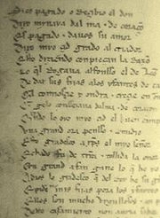
Romance copula
Overview
Latin
Latin is an Italic language originally spoken in Latium and Ancient Rome. It, along with most European languages, is a descendant of the ancient Proto-Indo-European language. Although it is considered a dead language, a number of scholars and members of the Christian clergy speak it fluently, and...
verbs "to be" (ultimately from Proto-Indo-European
Proto-Indo-European language
The Proto-Indo-European language is the reconstructed common ancestor of the Indo-European languages, spoken by the Proto-Indo-Europeans...
*h1es-, as in English is); "to stand" (ultimately from Proto-Indo-European *steh2-, as in English stand and German stehen); and "to sit" (ultimately from Proto-Indo-European *sed-, as in English sit). The verb was an irregular, suppletive verb
Suppletion
In linguistics and etymology, suppletion is traditionally understood as the use of one word as the inflected form of another word when the two words are not cognate. For those learning a language, suppletive forms will be seen as "irregular" or even "highly irregular". The term "suppletion" implies...
, with some of its forms (e.g.

